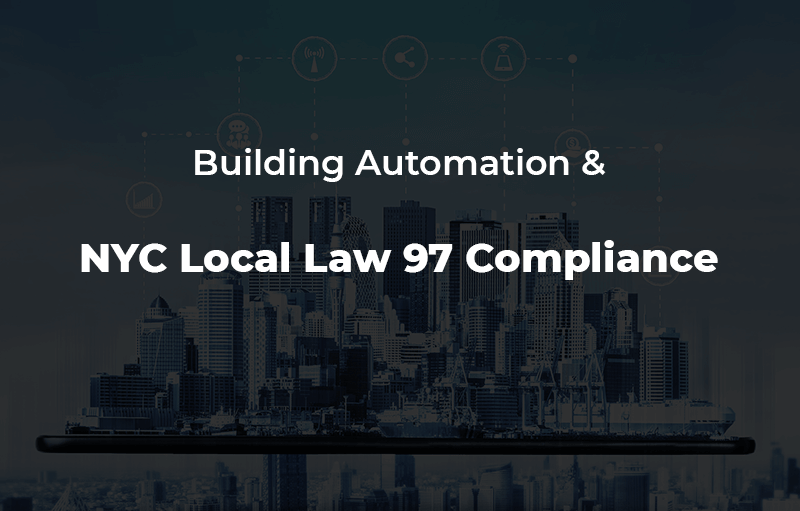
26 May Building Automation Systems and NYC Local Law 97 Compliance
Introduction:
New York City enacted Local Law 97, a landmark piece of legislation that sets ambitious emissions reduction targets for buildings over 25,000 square feet. The law requires these buildings to reduce their greenhouse gas emissions by 40% by 2030 and 80% by 2050.
Building automation (BA) can play a key role in helping buildings comply with Local Law 97. BA systems can monitor and control building systems such as HVAC, lighting, and energy management to optimize energy use and reduce emissions. This blog explores how building automation will play a key role in ensuring NYC Local Law 97 compliance, helping the building owners in achieving the required emissions reduction by the deadlines.
The Role of Building Automation:
Building automation systems (BAS) provide centralized control and monitoring of various building systems, including HVAC, lighting, and energy management. These systems leverage advanced technologies such as sensors, actuators, and data analytics to optimize energy usage and enhance overall operational efficiency. In the context of NYC Local Law 97, BAS offers several key benefits for compliance:
Continuous Monitoring and Reporting: Building owners must demonstrate compliance with Local Law 97 through regular reporting. BAS provides the necessary monitoring and reporting capabilities, streamlining the process by automatically collecting and aggregating data required for compliance reports. This feature reduces administrative burden and ensures accurate and timely submission of compliance data.
Data Collection and Analysis: BAS enables real-time data collection and analysis of energy consumption patterns. By monitoring and tracking energy usage across different building systems, operators gain insights into areas of inefficiency and can identify opportunities for optimization. This data-driven approach helps building owners make informed decisions to reduce energy consumption and carbon emissions.
Optimal Energy Management: BAS allows for sophisticated control strategies that optimize energy consumption based on occupancy patterns, weather conditions, and other factors. By integrating systems like lighting, HVAC, and ventilation, BAS can ensure energy is used more efficiently. Smart sensors and algorithms help adjust settings dynamically to match building occupancy, reducing wastage during unoccupied periods, and maintaining optimal comfort levels.
Fault Detection and Maintenance: Building automation systems can detect and identify system faults or malfunctions, allowing for timely maintenance and repairs. Proactive monitoring ensures that energy-intensive equipment, such as chillers or boilers, operates at peak efficiency. This preventive approach helps avoid energy waste, reduces downtime, and enhances overall building performance.
Demand Response and Peak Load Management: To comply with Local Law 97, buildings need to participate in demand response programs and effectively manage peak load periods. Building automation systems play a vital role in this aspect by enabling load shedding or shifting strategies. BAS can automatically adjust energy usage during peak demand events, reducing strain on the grid and helping buildings stay within the prescribed emission limits.
Conclusion:
NYC Local Law 97 represents a significant step toward a more sustainable future for New York City. Achieving compliance with this legislation requires innovative approaches, and building automation systems offer a powerful solution. By providing data-driven insights, optimizing energy usage, detecting faults, managing demand, and facilitating compliance reporting, BAS plays a pivotal role in helping buildings meet the stringent emission limits. As the implementation of Local Law 97 progresses, building automation will become increasingly indispensable in achieving New York City’s ambitious sustainability goals and setting an example for other cities worldwide.
Building Owners in NYC Will need to adapt to these changes and the latest technologies to stay compliant. Hire a trusted consultant like The Cotocon Group that can help you navigate through the entire process of compliance. We help building owners in protecting their assets, increasing their property values, avoiding fines and staying compliant with the laws. Call us Today!
